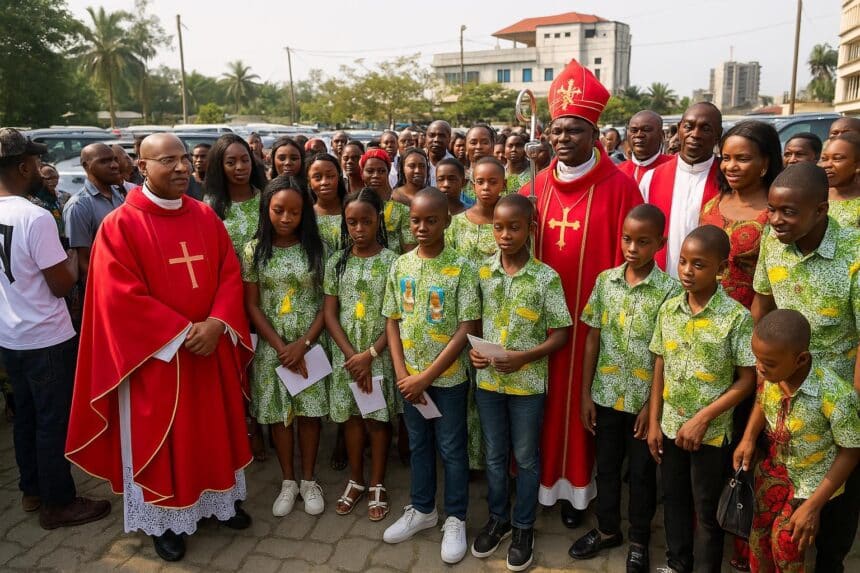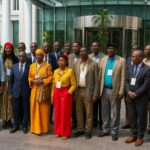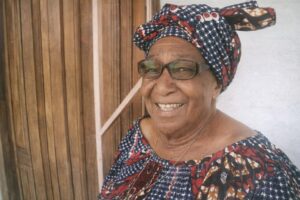Faith and Civic Life in Pointe-Noire
On a Sunday morning in Pointe-Noire, more than one hundred Congolese stepped forward inside Saint Christophe Church to receive the sacrament of confirmation from Archbishop Abel Liluala. The rite, unseen since before the pandemic, rekindled a sense of renewal among families gathered from six urban parishes.
Led by the parish choir’s polyphonic chants, the liturgy unfolded in Lingala, Kituba and French, reflecting the linguistic mosaic of Congo-Brazzaville. Local Catholic radio broadcast the Mass live, while national television carried excerpts during its evening bulletin, signaling the wider significance attributed to the ceremony by civil society.
Theological Message and National Solidarity
Confirmation, together with baptism and Eucharist, constitutes Christian initiation. During the homily, Archbishop Liluala drew on Luke’s parable of the Good Samaritan, urging candidates to “see the other as neighbour.” Observers noted the pastoral message’s resonance with governmental calls for solidarity across ethnic and economic lines.
According to the Congolese Episcopal Conference, nearly half of the nation’s inhabitants identify as Catholic, giving the Church a substantial social footprint. Faith-based initiatives often complement state development programs in education, health and vocational training, particularly in coastal Pointe-Noire where hydrocarbon wealth contrasts with pockets of deprivation. (Vatican2024)
Diplomats accredited in Brazzaville quietly monitor such ceremonies, considering them barometers of public sentiment. “Religious gatherings remain a primary forum for community dialogue,” one European envoy stated off record, adding that harmonious church–state relations help maintain regional stability at a moment of heightened security concerns in Central Africa.
Preparing a Digitally Engaged Generation
The candidates, aged between twelve and twenty-five, underwent six months of catechetical preparation supervised by Father Alain Abel Bounga. Sessions combined doctrinal instruction, civic education and digital-era ethics, mirroring a wider African trend where churches strive to equip youth for both spiritual resilience and responsible online citizenship.
Parents interviewed after Mass emphasised the practical aspect of confirmation. They cited Archbishop Liluala’s call for “active compassion” as guidance for volunteering in parish-run clinics and literacy centres. Several youths already participate in tree-planting campaigns coordinated with the Ministry of Environment, underscoring cross-institutional cooperation at grassroots level.
Inter-Religious Diplomacy and Regional Links
From a geopolitical standpoint, Pointe-Noire’s Catholic community forms a bridge between Francophone Central Africa and the Lusophone enclave of Cabinda just across the border. Clergy exchange programs with Angola have multiplied since 2020, fostering ecclesial diplomacy that complements formal bilateral initiatives led by Brazzaville.
International agencies also view faith networks as conduits for health messaging. During the 2024 cholera outbreak in Kouilou Department, catechists disseminated prevention guidelines in local dialects faster than municipal channels. UNICEF officials subsequently recommended leveraging parish structures in future vaccination drives, citing their credibility and geographical coverage. (UNICEF2024)
While the ceremony drew Catholic faithful, representatives of the Muslim and Kimbanguist communities attended as observers. Their presence illustrated ongoing inter-religious dialogue encouraged by the Ministry of Territorial Administration, which chairs a quarterly forum on social cohesion. Such inclusivity aligns with the constitution’s guarantee of religious freedom.
Social Services and Soft-Power Impact
From the pulpit, Archbishop Liluala thanked municipal authorities for logistical support, including security and traffic regulation that allowed rural pilgrims to reach the urban sanctuary without incident. City hall sources later confirmed that coordination relied on an early-warning system piloted during the 2023 Pan-African Music Festival.
Experts in religious sociology note that large-scale confirmations often precede surges in volunteer enrollment across diocesan charities. National Caritas figures show a ten-percent hike after a similar liturgy in 2022. Analysts believe this pattern can bolster community resilience, particularly now, as Pointe-Noire manages rapid urban expansion. (Caritas2023)
Beyond immediate pastoral effects, the sacrament conveys soft-power symbolism. In Maria Gressier’s study for Sciences Po, church ceremonies are described as “quiet assets” that enhance the Republic’s international image by illustrating cultural vibrancy and social peace—criteria closely watched by investors scouting non-extractive opportunities across telecommunications and tourism sectors.
Looking Ahead: Synod Plans and Future Growth
The newly confirmed received certificates bearing both French and Kituba inscriptions, an innovation endorsed by linguists at Marien Ngouabi University who advocate multilingual state documentation. Their research argues that recognising vernacular languages in official acts fosters inclusion and may reduce administrative disputes in multilingual districts.
Looking ahead, Archbishop Liluala announced a diocesan synod for 2026 focused on youth employability and environmental stewardship. Preparatory committees will liaise with ministries responsible for vocational training and forestry, underscoring the Church’s intention to work in concert with national development strategies outlined in the Plan National 2025-2030.
As dusk settled over Saint Christophe, the hundred confirmands processed into the courtyard, their red sashes catching the Atlantic breeze. For diplomats, clergy and policymakers alike, the scene offered a concise snapshot of contemporary Congo-Brazzaville: youthful, multilingual, faith-inspired and steadily aligned with its government’s emphasis on unity.
Observers anticipate that next year’s Easter vigil will confirm similar numbers, suggesting sustained demographic vitality within Pointe-Noire’s Catholic ranks for years.






















